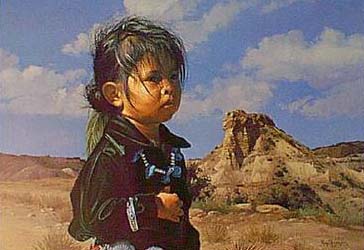|
Arizona attorney general says 'English-only' does not apply
to tribes or federal schools
 There
was a welcome sigh of relief to Arizona Attorney General Janet Napolitano's decision that the English-only proposition
approved by Arizona voters does not apply to tribal or federal schools. There
was a welcome sigh of relief to Arizona Attorney General Janet Napolitano's decision that the English-only proposition
approved by Arizona voters does not apply to tribal or federal schools.
Napolitano released an opinion Feb. 15 that stated Proposition 203 does not apply to the tribes or federal government
and that federal law restricts its application to public schools on the reservation.
Sen. Jack Jackson, D-Window Rock, requested the opinion.
Napolitano based her opinion on the Navajo Nation Code, Native American Languages Act of 1990 and prior court cases.
"One reason for the unique treatment of Native American languages under federal law is that many Native American
languages are threatened with extinction," Napolitano wrote.
"Under Navajo law, the Navajo language is considered an 'essential element of the life, culture and identity
of the Navajo people," she said. "Moreover the Navajo Code recognizes 'the importance of preserving and
perpetuating language to the survival of the Nation."
Prop. 203 replaces bilingual education in Arizona schools and forces students to undergo a one-year English immersion
program. It has a waiver on a case-by-case situation.
Napolitano wrote "The law is based on the idea that 'immigrant children' can gain full fluency in English
by heavy exposure to that language at a young age."
Napolitano stated that Prop. 203 applies only to "Arizona public schools," which by definition are "created
by state law and financed by the state."
She added, "Although state law governs the operation of public schools, it is still necessary to determine
if federal law itself, including concerns for tribal sovereignty, bars the application of Proposition 203 to Native
American students in state public schools located within or outside the reservation."
Using Mescalero Apache Tribe vs. Jones (1973), Napolitano said state laws must apply unless it interferes with
reservation self-government or would impair a right granted or reserved by federal law.
Finally, she stated that Prop. 203 does not prohibit any public school from teaching Native American language and
culture.
"It is important to recognize that Proposition 203 does not seek to ban the use of Navajo in state public
schools," she wrote. "Indeed, a strong argument can be made that Proposition 203 was not intended to
apply to Native American languages at all.
"State public schools may offer students classes in Native American languages and culture, whether or not
such children are already proficient in English," she said. "To avoid any such conflict, state public
schools should not restrict 'the right of Native Americans to express themselves through the use of Native American
languages' in publicly supported education programs."
The overwhelming "nay" vote to Prop. 203 in Apache, Coconino and Navajo counties weighed heavily in Napolitano's
decision, said LeNora Y. Johnson of the Division of Diné Education.
"The way the three counties voted showed the attorney general that the Native Americans want to continue their
teachings in the schools," Johnson said. "It's good news. The support of the youth, grassroots people
and the people who lobbied in Phoenix all made a difference."
Nearly 1.5 million people voted in the statewide referendum election. The vote for Prop. 203 had 925,415 "yes"
votes (63 percent) and 542,942 "no" votes (37 percent).
Apache County voted 4,507 for and 14,050 against, Coconino County voted 17,366 for and 22,093 against and Navajo
County voted 11,095 for and 13,665 against.
The only other county out of the 15 counties that voted against the proposition was Greenlee County, which does
not have large Native American population.
Rep. Sylvia Laughter, D-Kayenta, who was recently named co-chairman of the newly created Native American Affairs
Committee, sees the attorney general's opinion as a positive for the Diné.
"This opinion is a clear victory for the Navajo Nation," Laughter said. "It reaffirms our nation's
sovereignty and ensures our freedom to teach our heritage without fear of interference from the state."
Jackson, upon the request of President Kelsey Begaye, asked Napolitano for the opinion because only a member of
the Legislature can request an opinion.
"This will resolve the issues unless someone takes us to court," he said. "I don't think anybody
is going to challenge it."
Jackson, presently attending the Arizona Legislature in Phoenix, said in talking with fellow legislators of Hispanic
descent, it appears that some members of the Spanish-speaking population may file a lawsuit against the proposition.
When Prop. 203 passed Nov. 7 there was talk that the Navajo Nation would file a lawsuit. However, Jackson said
the lawsuit was delayed in lieu of Napolitano's opinion.
"I guess this is what we wanted," he said. "There were a lot of questions coming from the schools
up there, now it's quiet."
The opinion affects the 21 recognized Native American tribes in Arizona.
|

 There
was a welcome sigh of relief to Arizona Attorney General Janet Napolitano's decision that the English-only proposition
approved by Arizona voters does not apply to tribal or federal schools.
There
was a welcome sigh of relief to Arizona Attorney General Janet Napolitano's decision that the English-only proposition
approved by Arizona voters does not apply to tribal or federal schools.